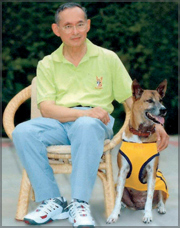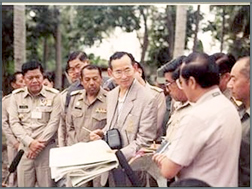|
|
|
|
At the same time, all medical staff of Siriraj Hospital began to put on yellow outfits and decided to wear yellow until the King was discharged. Next day, millions of others across the nation joined them.
The expression of every citizen of the country had one thing in common - it all came from their hearts. It reflected the true measure of what the King has achieved: the everlasting and fierce loyalty of the common man, whom he has worked so hard for and cared so much about.
Prince Bhumibol Adulyadej was born in 1927 as the youngest son of Mahidol Adulyadej, Prince of Songkhla (son of King Chulalongkorn).
After primary schooling in Bangkok, in 1933 he left for Switzerland, where he continued his secondary education and received the high-school diploma with a Major in French literature, Latin, and Greek.
He was studying science at the University of Lausanne when his elder brother was crowned King of Thailand. Bhumibol stayed in Switzerland until 1945 to complete his studies.
Bhumibol succeeded to the throne following the death of his brother on June 9, 1946, in what was officially described as an accidental shooting at the Royal Palace in Bangkok.
Interventions
Although he is just a Constitutional Monarch, the King has several times made decisive interventions in Thai politics.
|
|
For example, in 1992, he played a key role in Thailand's final transition to a fully democratic system. A coup on February 23, 1991 put Thailand back under military dictatorship. General Suchinda Kraprayoon, a leader of the coup, took over the premiership.
This caused much dissent, and the conflict escalated to demonstrations and then to a large number of deaths when the military was brought in to control the crowd. The situation became increasingly critical and the violence escalated.
The King summoned Suchinda and the leader of the pro-democracy movement, Major General Chamlong Srimuang, to a televised audience.
At the height of the crisis, the sight of both men appearing together on their knees (in accordance with royal protocol) made a strong impression on the nation, and led to Suchinda's resignation soon afterwards.
It was one of the few public occasions where the King directly intervened in a political conflict. A general election was held shortly afterward, and democracy was restored.
To quote another instance, the King was also closely involved in the Thailand Political Crisis of 2005-2006.
In April 2005 Prime Minister Thaksin Shinawatra presided over a ceremony at the Temple of the Emerald Buddha, the holiest site in Thai Buddhism. A leading Bangkok newspaper alleged that Thaksin had usurped the powers of the King by presiding over the ceremony.
The newspaper promoted the use of slogans such as "We Love the King", "We Will Fight for the King", and "Return Power to the King" in anti-Thaksin rallies.
In fact, the King had approved Thaksin presiding over the ceremony, but the Newspaper owner continued to use royal slogans in anti-Thaksin protests until Thaksin announced, after an audience with Bhumibol, he was stepping down.
Weeks before the April 2006 legislative election, the anti-Thaksin coalition petitioned the King to appoint a replacement Prime Minister and Cabinet to resolve the political crisis.
The King, in a speech on 26 April, responded "Asking for a Royally to appoint Prime Minister is undemocratic. It is, pardon me, a mess. It is irrational".
Few days after publicly declaring victory in the April parliamentary elections, Thaksin had a private audience with King Bhumibol.
A few hours later, a shaken Thaksin appeared on national television to announce that he would not accept the Premiership, and would be taking leave from politics.
In a rare, televised speech, the King requested that the judiciary take action to resolve the political crisis. On 8 May 2006, the Constitution Court invalidated the results of the April elections and ordered a new round of elections.
Many such examples could be quoted where tensions were relieved and disasters were avoided by the King's intervention. His advice is respected as he is revered as a semi-divine figure by most Thais.
Social Service
For over half a century, the working monarch has visited almost every nook and cranny in the country and has conceived thousands of development projects to help the underprivileged. His achievements are multifarious.
But they all are governed by the same goal: social harmony. Teaching through example, the King has shown the citizens how to achieve this ultimate goal through the way he works.
His rules of thumb include: always get first-hand knowledge, learn how nature works, restore the environment, listen to the people, avoid inter-agency rivalry, and strive for self-sufficiency. Persevere. And be content with moderation.
Without any doubt, his visions for Thailand are deeply rooted in Buddhist philosophies of self-reliance, moderation and compassion, as well as respect for nature and the law of interdependency.
In short, the King has shown Thailand a new path towards sustainable development that nurtures nature, empowers the people and fosters spiritual growth.
In 1988, the King established the Chaipattana Foundation to handle projects. The main objective of the foundation was to help accelerate rural development and it soon resulted in the doubling or even trebling of income for agricultural workers while, at the same time, conserving the environment.
It also helped the government to circumvent budgetary problems by using start-up funds from public donations.
Reciprocation by the government resulted in the setting up of the Office of the Royal Development Projects Board (ORDPB) with government funding.
Since the King's projects were invariably community-based, projects undertaken by ORDPB provided critical links between the marginalised population and government agencies.
Project planning in this instance was no longer top-down but was instead formulated together with people at the grass-roots level.
Many community research projects were instituted under the Chaipattana Foundation. One research resulted, for example, in an artificial rain-making process now adopted in neighbouring countries, and aerators which today are in use all over the country as well as abroad, including, recently, Belgium.
The King initiated a total of over 3,725 projects under the Chaipattana Foundation from its inception through to 2006. In addition to programmes under the Royal Project Foundation, the number of projects initiated by His Majesty comes to 4,350.
This does not include hundreds of more initiatives under healthcare projects and research programmes affiliated with or outsourced to universities and other institutions.
The King worked with a relatively low profile. Little do anyone realised that this extraordinary monarch has been spending more than half the year away from the affluence of Capital to institute programmes in rural communities, that is until in recent years when his doctors curbed his activities due to the state of his health.
When UN Secretary General Kofi Annan presented King Bhumibhol with the first UNDP Human Development Lifetime Achievement Award few months ago, he said, "If human development is about putting people first, there can be no better advocate for it than His Majesty.
As the world's 'Development King', His Majesty reached out to the poorest and the most vulnerable people of Thailand, listened to their problems, and empowered them to take their lives into their own hands."
His words could not have rung more true. For six decades, not a single day has passed in which the Thai people have not felt His Majesty's dedication to the poor, the vulnerable, the sick, the young, the aged and those faceless people on the street, and this affectionate bond between the 79-year-old King and his 62 million subjects grows stronger every day.
..................................










